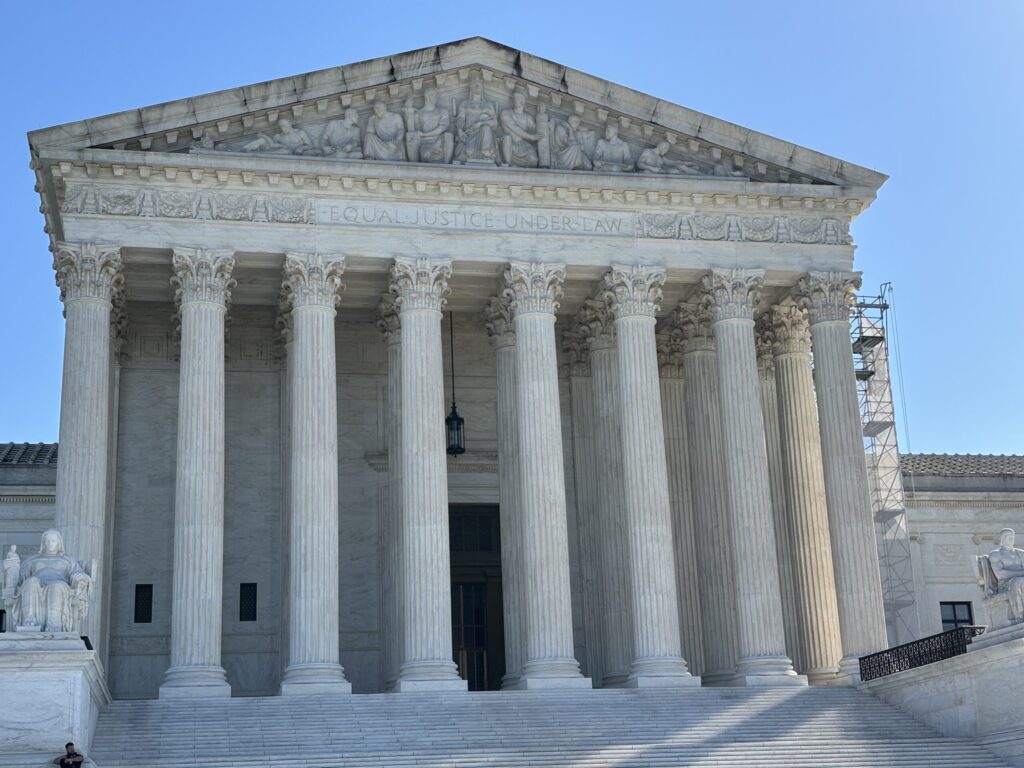
Vice President Kamala Harris, the Democratic presidential nominee, and former President Donald Trump, the Republican nominee, are giving voters very different answers when it comes to any changes at the U.S. Supreme Court. Photo by Jane Norman/States Newsroom
This is one in a series of States Newsroom reports on the major policy issues in the presidential race.
WASHINGTON — Democrats have increasingly cried out for new rules for the nation’s highest court, and the 2024 presidential election reflects a clear party divide over how Supreme Court justices should behave and whether they should remain on the bench for life.
The erasure of a nearly 50-year-old national right to abortion, the granting of wide latitude for former presidents to escape criminal accountability and several ethics scandals magnified these questions. Vice President Kamala Harris and former President Donald Trump are giving voters very different answers.
Harris’ platform calls for “common-sense” reforms that include term limits for justices and an enforceable ethics code that mirrors the rules that apply to lower federal judges.
When President Joe Biden announced his proposals for Supreme Court ethics reform roughly one week after dropping his bid for reelection, Harris issued a statement reinforcing the need to “restore confidence” in the court.
“That is why President Biden and I are calling on Congress to pass important reforms — from imposing term limits for Justices’ active service, to requiring Justices to comply with binding ethics rules just like every other federal judge. And finally, in our democracy, no one should be above the law. So we must also ensure that no former President has immunity for crimes committed while in the White House,” she said.
While Harris’ campaign did not provide additional details on her platform, Harris has a record of supporting such measures. As a senator in 2019, Harris co-sponsored a bill to enforce a uniform ethics code at every level of the federal judiciary, including the Supreme Court.
Trump position
When asked for comment about Trump’s stance on enforceable ethics rules or term limits at the Supreme Court, Trump campaign Senior Advisor Brian Hughes responded: “President Trump has said that, apart from matters of war and peace, the nomination of a Supreme Court justice is the most important decision an American President can make. As president, he appointed constitutionalist judges who interpret the law as written, and he will do so again when voters send him back to the White House.”
The former president has made his opposition to change known on social media.
Nearly two weeks before Biden’s speech in July to roll out his ideas for improving the court, Trump wrote on Truth Social that the “Radical Left Democrats are desperately trying to ‘Play the Ref’ by calling for an illegal and unConstitutional attack on our SACRED United States Supreme Court.”
“The reason that these Communists are so despondent is that their unLawful Witch Hunts are failing everywhere. The Democrats are attempting to interfere in the Presidential Election, and destroy our Justice System, by attacking their Political Opponent, ME, and our Honorable Supreme Court. We have to fight for our Fair and Independent Courts, and protect our Country. MAGA2024!” he continued, randomly capitalizing words as he often does.
The Republican National Committee stated in its platform that the party unequivocally opposes any changes to the number of Supreme Court justices.
“We will maintain the Supreme Court as it was always meant to be, at 9 Justices. We will not allow the Democrat Party to increase this number, as they would like to do, by 4, 6, 8, 10, and even 12 Justices. We will block them at every turn.”
At the Economic Club of Chicago on Oct. 15, Trump appeared to accuse Democrats of wanting to add up to 25 new justices to the Supreme Court bench.
Harris’ 2024 campaign position on the Supreme Court does not include a plan to change the number of justices. During her 2020 presidential run, Harris expressed an openness to expanding the court, according to Politico and other reports. Biden, at the time, remained opposed to changes, including justice term limits.
Immunity ruling
When Trump was charged with federal fraud and obstruction crimes for his attempts to subvert the 2020 presidential election results, he escalated his appeal for presidential immunity all the way to the Supreme Court.
On July 1, the justices issued a 6-3 opinion granting former presidents criminal immunity for “core constitutional” duties and presumptive immunity for actions on the “outer perimeter” of official duties, but none for unofficial, personal acts.
Two of the justices who joined the conservative majority ruling — Neil Gorsuch and Brett Kavanaugh — were Trump appointees. Justice Amy Coney Barrett, also appointed during Trump’s time in the Oval Office, joined them, concurring in part.
Trump’s case was delayed for the better part of 2024, tied up in the high court process as he campaigned for a second presidency. The delay ultimately closed the door on a trial before November’s election.
The high-profile case not only highlighted the fact that Trump was being judged by his own appointees, but also that two other justices had been recently exposed in ethics scandals involving Republican donors and appearing to show support for Trump’s false claims that he won the 2020 election.
In April 2023, ProPublica uncovered that Justice Clarence Thomas had been accepting luxury travel and other big ticket gifts from Republican billionaire donor Harlan Crow.
In May of this year, the New York Times published photos of an upside-down American flag flying outside the home of Justice Samuel Alito following the violent riot by Trump supporters at the U.S. Capitol on Jan. 6, 2021. The upside-down flag, a general symbol of protest, had been adopted by Trump supporters who believed the 2020 election was stolen.
All parties have denied any wrongdoing, and Alito declined to recuse himself from Trump’s 2020 election subversion case, and another case brought by a Jan. 6 defendant.
The call for a new ethics code
While the Thomas and Alito scandals attracted the most attention, observers of the court say many of the justices’ actions raise ethics questions.
Gabe Roth, founder of the nonpartisan nonprofit Fix the Court, said “no justice has totally behaved ethically.”
Roth cited transgressions by both conservative and liberal justices: socializing with litigants who argue before the court, the use of government resources to promote a personal book and instances of justices not recusing themselves from cases in which they appear to have a stake.
“It hasn’t been to the scale of the things that ProPublica uncovered, but no justice is fully pure when it comes to ethics issues, which is not to say that they’re all corrupt or they’re all compromised by any means. It’s just more, to me, a fact that the whole institution needs to focus more on ethical leadership,” Roth said.
ProPublica published numerous stories in 2023 detailing gifts Thomas never disclosed, as well as a luxury fishing expedition Alito took with a Republican billionaire who argued before the court.
The Supreme Court currently polices itself with its own code of conduct and maintains justices already follow rules that apply to lower federal judges.
Congressional Democrats have introduced several bills aiming to impose ethics rules on the justices and limit life-time appointments, for example to 18 years.
A bill led by Sen. Sheldon Whitehouse (D-R.I.) passed the Democratic-led Senate Judiciary Committee in July 2023. The legislation aimed to mandate an enforceable ethics code, tighten recusal and gift disclosure requirements, and establish a complaints process similar to that of the lower courts.
An attempt at unanimous consent passage on the Senate floor in June was blocked by Senate Judiciary’s top Republican, Sen. Lindsey Graham of South Carolina.
“Let’s be clear, this is not about improving the court, this is about undermining the court,” Graham said on the floor.
Roth said no matter who wins the presidency and which party takes control of the Senate, the longtime fight for an ethics overhaul and term limits at the high court will continue — and that it shouldn’t be partisan.
“If they’re done right, it doesn’t favor one party or another or one ideology or another. It’s a bit weird that one side is saying they don’t love ethics right now,” Roth continued. “I don’t get it.”
EMEA Tribune is not involved in this news article, it is taken from our partners and or from the News Agencies. Copyright and Credit go to the News Agencies, email news@emeatribune.com Follow our WhatsApp verified Channel




